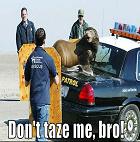denisonh
Posts: 2194
Joined: 12/21/2001
From: Upstate SC
Status: offline

|
It is easy to judge after the fact, as they say: "hindsight is 20 20".
The man achieved excellent results. That is far more important. You can talk about being good, but being good is another story. Denigrating a man's achievements after the fact is simply too easy.
Qualifying his success is way to easy given hindsight.
Let's talk about good sense.
quote:
You began talking about his leadership style, bold etc. This is just good sense when you are outnumbered. Nothing outstanding there.
How many generals did not show "good sense" when outnumbered? More than did I can tell you that. That is an easy judgement to make as an armchair general.
As for micromanagers, I wil not disagree, as the impetus for micromamagers to continue is achieving success. Wellington was successful as a micromanager with a small army, and more than likely would have failed with a larger force. But do not make the mistake of thinking that it was not "adequate to the task". HE ACHIEVED THE DESIRED RESULTS. That goes farther than any kind of theoretical discussion after the fact.
History is rife with examples of "adequate generals", but it is less than appropriate to ascribe that decsription to one who achieved superoir results consistently over a time period that exceeded that of WWII.
quote:
ORIGINAL: morvwilson
quote:
ORIGINAL: denisonh
Combat is funny thing, and evaluating leadership with respect to combat puts a premium on results.
Be in charge long enough and a general will experience setbacks, but the best generals will not lose thier commands in the process. I would say Wellington would rate as an effective general as any, given the results achieved with the forces given and the conditions he fought under. Not an overabundance of examples where numerically inferior forces defeated a numerically superior French Army, and he is associated with many of them.
His leadership style suited the British needs, as he was bold without being stupid, patient without being tentative, and determined to win. He was a micro manager, and the difficulties at Waterloo to a certain extent bear that out. He rarely fought a field battle in a location that he did not choose. He was great with a small disciplined Army, and most accurate modeling of his leadership will reflect that (limited span of control).
To write him off as something simply adequate is a bit of a mischaracterization of what he achieved. Let us remember that the British government's tendency to marginalize thier general's ability to operate was almost a bigger problem to overcome than the enemy itself at times!
I know you are trying to defend Wellington, but it seems to me your defense merely exposes his short commings.
You began talking about his leadership style, bold etc. This is just good sense when you are outnumbered. Nothing outstanding there.
You correctly point out that he was a micromanager. This is a sign of a poor executive. The main job of an executive is to pick the right man for the job and them let him do it. A micromanager or someone who constantly shuffles his staff proves himself to be incapable of this function.
You say correctly that he was great with a small disciplined army. Why do you suppose that junior officers are put in charge of platoons, companies and batalions? Because it is easier than running a regiment or division.
So again, Wellington seems to be simply adequate for the job he had.
_____________________________
 "Life is tough, it's even tougher when you're stupid" "Life is tough, it's even tougher when you're stupid" -SGT John M. Stryker, USMC
|
 Printable Version
Printable Version














 New Messages
New Messages No New Messages
No New Messages Hot Topic w/ New Messages
Hot Topic w/ New Messages Hot Topic w/o New Messages
Hot Topic w/o New Messages Locked w/ New Messages
Locked w/ New Messages Locked w/o New Messages
Locked w/o New Messages Post New Thread
Post New Thread